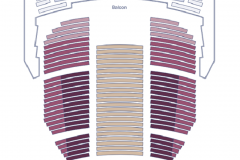Aida
Mo | Tu | We | Th | Fr | Sa | Su |
Melodramma in four acts
Music by Giuseppe Verdi (1813-1901)
Libretto by Antonio Ghislanzoni, based on a scenario by François Auguste Ferdinand Mariette reworked by Camille du Locle
Premiere: Cairo, Khedival Opera House, 24 december 1871
Production of the Rome Opera House
Set in a pseudo-historic vision of Ancient Egypt, Giuseppe Verdi’s Aida depicts a dramatic clash between Aida and Amneris, haughty princesses battling for the valiant warrior Radames’s love.
Aida had been commissioned for the inauguration of the Suez Canal, hence its reputation for cinemascopic dimensions – elephants included. The first Monaco performance in 1884 had to suffer cuts in the mass scenes due to the size of the Salle Garnier. In 2025, this poses problems no longer since Davide Livermore and his team can work in the expanse of the Grimaldi Forum where they have already proven an amazing creativity in using modern technology for breathtaking scenery.
At closer examination, however, her numerous arias, duets and trios reveal Aida’s intimate chamber musical side, which dominates most of the opera’s acts. Verdi’s writing for the voice and the colourful orchestral part are at their best when depicting what were often called “female weapons”: charm and seduction, slander, deception, and – once defeated – self-destruction and ruining of the cherished object.
In such situations, beautiful and refined singing counts. Enjoy a stellar cast, which shows you both sides of this magnificent opera: its grandeur, and its fragility!
Synopsis
Act I
The Ethiopian princess Aida is being held captive in Egypt, although no one knows of her royal origins. Also kept secret is the love between Aida and Ramadès, the young Egyptian military commander.
The high priest announces that the Ethiopians have attacked Egypt again and informs Radamès that Isis has named him to lead the Egyptian forces. Amneris, the pharaoh's daughter, is also in love with Radamès and hopes that if the young general returns victorious, he will marry her. Radamès, however, nourishes the hope that if he wins a victory, he will be able to marry his secret love, Aida, who herself is confronted with the choice of whose victory she should pray for: her lover's or that of her father and her homeland?
Act II
Aida's father attacks Egypt in order to free his daughter, but suffers a defeat. Radamès returns home victorious with Aida's father among the captured soldiers. The pharaoh announces that he will reward Radamès by granting any request of his. The general asks for the Ethiopian prisoners to be set free, but the high priest obstructs this. The pharaoh offers his daughter, and his throne, to Radamès.
Act III
Under cover of night, Aida awaits Radamès, who had invited her to a secret meeting on the bank of the Nile. The princess feels her situation to be hopeless: her beloved is getting ready to marry the pharaoh's daughter, and she cannot return home. Suddenly, her father appears and pressures her mercilessly: he knows that her lover is the enemy's general, and he orders her to lead Radamès into committing treason.
Trusting Aida, Radamès betrays secret military information, at which point Amonasro rushes out and reveals to Radamès that he is the king of Ethiopia.
The jealous Amneris also bursts forth with her entourage, but before she can have the treasonous general arrested, Radamès succeeds in ensuring the escape of both Aida and her father.
Act IV
The despairing Amneris tries to save the life of the man she loves and who has been condemned to death because of her, but Radamès has no wish to live without Aida. The death sentence is carried out, and Radamès is sealed alive in a crypt. In the silent tomb, Aida emerges from her hiding place in order to die together with her love.
Program and cast
Production Team
Conductor | Massimo Zanetti
Director | Davide Livermore
Sets | Giò Forma
Costumes | Gianluca Falaschi
Lighting design | Antonio Castro
Videos | D-Wok
Choreography | Davide Livermore & Carlo Massari
Choirmaster | Stefano Visconti
Assistant director | Chiara Osella
Assistant costumes | Giuditta Verderio
Repetitor | Kira Parfeevets
Cast
The King | Antonio Di Matteo
Amneris | Marie-Nicole Lemieux
Aida | Anna Pirozzi
Radamès | Arsen Soghomonyan
Ramfis | Erwin Schrott
Amonasro | Artur Rucinski
Voice of the Priestess | Galia Bakalov
A messenger | Vincenzo di Nocera
Choir of the OPÉRA DE MONTE-CARLO
ORCHESTRE PHILHARMONIQUE DE MONTE-CARLO
Grimaldi Forum, Monaco
The perfect setting to stir up your audience. Equipped with exceptional acoustics and high-performance audio-visual equipment, this auditorium is the ideal place for your plenary sessions, awards ceremonies, product launches or other shows. With 1,000 m² of stage area, your event is sure to gain momentum and make a lasting impression!
STAGE SURFACE AREA
1,000 m² with a 690 m² main stage,
185 m² of side stage and 140 m² backstage.
CAPACITY
1,864 seats with foldout tables,
with 516 of these seats in the balcony.
TECHNICAL FEATURES
3 control rooms: sound, projection, lighting
5 simultaneous translation booths

 EN
EN DE
DE IT
IT FR
FR ES
ES RU
RU JP
JP RO
RO
 Seating plan
Seating plan 